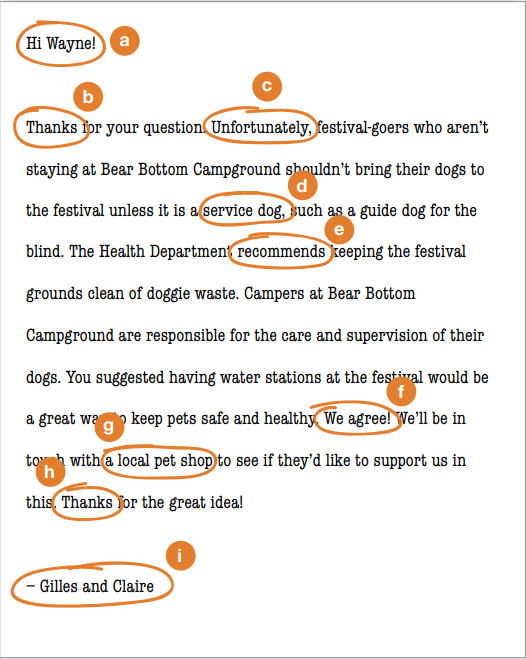10 Writing
Scaffolding Genre
Generally, when Canadians make requests or suggestions, the more indirect or soft we are, the more context we give. Giving context means we give reasons and details because we are concerned that the request is inconvenient or because we are worried that the other person will respond negatively.
When Canadians respond indirectly to requests and suggestions, we also give context, especially if we are saying “no.” Canadians often give more context with a negative response, especially if the relationship with the other person is important, delicate, distant, or unfamiliar. Sometimes, Canadians don’t even say the word “no,” they will just give a reason for refusing or not agreeing.
Scaffolding Genre-exploring Activity
![]() Read one request from Wayne who attended the town hall meeting and filled out a suggestion card that Gilles handed out.
Read one request from Wayne who attended the town hall meeting and filled out a suggestion card that Gilles handed out.
Card 1
Maskwa Folk Fest Suggestion Card
Date: March 12, 2016
Message:
Hey! Wayne Clarkson here. Are dogs allowed at the festival? I think it might be a great idea to have water stations around the festival so the dogs don’t get too hot or thirsty. Is this possible? Thanks.
Notice Wayne’s mix of questions and statements.
Look at the verbs that he uses to soften phrases. Wayne is definitely not making a demand.
![]() Read the reply from Gilles and Claire.
Read the reply from Gilles and Claire.
Hi Wayne!
Thanks for your question. Unfortunately, festival-goers who aren’t staying at Bear Bottom Campground shouldn’t bring their dogs to the festival unless it is a service dog, such as a guide dog for the blind. The Health Department recommends keeping the festival grounds clean of doggie waste. Campers at Bear Bottom Campground are responsible for the care and supervision of their dogs. You suggested having water stations at the festival would be a great way to keep pets safe and healthy. We agree! We’ll be in touch with a local pet shop to see if they’d like to support us in this. Thanks for the great idea!
– Gilles and Claire
Example Response
As the Folk Fest organizers, Gilles and Claire replied to Wayne using an informal note. Let’s look at the format and the style.

![]() Find the following parts of the note:
Find the following parts of the note:
a) A friendly greeting and informal punctuation
b) A reference to the original message
c) Using a sympathetic adverb to soften a rule
d) Mention of an exception to the rule to avoid misunderstandings
e) An explanation of the reasons(s) for a rule
f) Acceptance of an idea
g) A follow-up action
h) Expression of positive feelings
i) A casual closing
Someone else attended the community meeting and handed in a card anonymously. Read the comments. Look at verbs, as well as adjectives, to catch the writer’s feelings.
Card 2
Maskwa Folk Fest Suggestion Card
Date: March 16, 2016
You can’t ban alcohol! You can’t! That is the worst idea ever. You must get a liquor license or nobody will be able to have a good time at the festival, especially young people. Change it or else!
Because the writer didn’t give a name, it’s impossible for anyone to write a personal reply to this emotional, rather threatening note. However, Gilles responded with an “open letter” in the Maskwa Times. ![]()
![]() Look for
Look for
a) a greeting
b) a reference to the original message
c) an understanding tone
d) a rule or decision
e) a reason or two
f) acceptance of ideas
g) expressing the positive
h) ways to follow up
i) a closing
Open Letter to Maskwa County
This is a shout-out to the young people of Maskwa County! It was great to see several of you at the town hall meeting. Your ideas matter to us. I’m hoping to answer an unknown writer who wrote from the heart.
As you may know, last year, two festival volunteers were injured in a car crash involving alcohol. We’re all really thankful they’ve recovered. When they asked us, “How about not allowing alcohol this year?” the festival organizers decided we wouldn’t have a beer garden on the new festival site. Drivers can only get to Bear Bottom Campground on Willow Lake Road. It’s a winding, hilly route on loose gravel. Like you, we really want everyone to have an awesome time before, during, and after the weekend of sweet tunes and starry nights.
Because a ban on alcohol reduces the permits we must buy and the security we would have to hire, tickets for youth aged 18 to 24 will cost 30% less than a year ago. That’s a bonus for you!
Keep your comments coming. You can always reach us at Maskwa Folk Fest on SpaceBook messenger.
Gilles Doucette
Scaffolding Mechanics, Grammar, and Syntax Activity
 A gerund is an action word (verb) that ends with –ing. A gerund looks like a verb but does the job of a noun.
A gerund is an action word (verb) that ends with –ing. A gerund looks like a verb but does the job of a noun.
After you use the verbs recommend or suggest, use a regular noun or a gerund (-ing) as the object.
For example, Claire might say, “I recommend Kerry Ames.”
Or she could say, “I recommend calling Kerry.”
Here are some more examples of gerunds:
- I suggest calling him before noon.
- I would recommend calling him right away.
- I might suggest calling him as soon as possible.
- I wouldn’t suggest calling now.
- I don’t recommend calling him at home.
Other request phrases that use a gerund (-ing) are “Would you mind …?” and “How about …?”
- Would you mind answering the phone for me?
- How about calling Ivan about his dogs?
 An infinitive is also a kind of verb but it has the word to before a basic action word. Some suggestions, requests, and instructions use an infinitive.
An infinitive is also a kind of verb but it has the word to before a basic action word. Some suggestions, requests, and instructions use an infinitive.
Here are several examples of infinitives:
- Would you be able to answer the phone?
- Would it be possible to call Claire?
- It might be a good idea to call her later.
- I was hoping to call her now.
When you use a modal verb (can, could, might, must, should, or would), the next word is always the base form of a verb, never a gerund or an
infinitive. The base form has no suffixes such as -ed or -ing. The base form matches the spelling of a dictionary entry.
Here are examples of correct modal verbs + base forms contrasted with common errors:
| ✔ Can you call Claire?
✔ We could call her. ✔ You might call Claire on her landline. ✔ You must not call her at home. ✔ I think we should call her first. ✔ I wouldn’t call her before nine o’clock in the morning. ✔ We should not call at night. |
✘ Can you calling Claire?
✘ We could to call her. ✘ You might to call Claire. ✘ You must not calling her. ✘ I think we should calling her. ✘ I wouldn’t to call her. ✘ We should not calling at night. |
Practise using a gerund or an infinitive. ![]()
![]() Match the modal verb expressions on the left with a phrase on the right to make correct suggestions, requests, or instructions. There is more than one correct way to complete some sentences.
Match the modal verb expressions on the left with a phrase on the right to make correct suggestions, requests, or instructions. There is more than one correct way to complete some sentences.
| 1. | I was hoping I could | lending me your cellphone? |
| 2. | Would it be possible | use your cellphone. |
| 3. | Would you mind | calling her so late at night. |
| 4. | I suggest | adding more recycling bins |
| 5. | Maybe we should | add more recycling bins. |
| 6. | I don’t recommend | to use your cellphone? |
| 7. | It might not be a good idea | to call her so late at night. |
Look back at Card 1 (page 87) and Card 2 (page 90) and the responses from Gilles and Claire. 
![]() Scan for and copy:
Scan for and copy:
|
3 Gerunds (basic verb + ing) |
6 Infinitives (to + basic verb) |
11 Modal Verbs (can, could, might, must, should, would + basic verb) |
|---|---|---|
|
|
Writing 1 
People in Maskwa County filled out cards at the town hall meeting. Here is another note from the community meeting suggestion box:
Maskwa Town Hall Suggestion Card
Date: April 5, 2016
Hi guys! I was wondering if it would be possible to remove all the new electrical poles. I know they will help bring more power to the festival, but … I think aliens from outer space are using them to read my mind, and I’d like my thoughts to stay private, especially when I’m choosing lottery numbers. Thanks!
– Marvin Martini
Take the role of either Gilles or Claire.
![]() Write an informal note of 9 to 12 sentences to respond to the message from Marvin.
Write an informal note of 9 to 12 sentences to respond to the message from Marvin.
- Format your message as an informal note.
- Refer to the original message and the tone of the writer.
- Give context (reasons and details) for your responses.
- Accept ideas if possible and express positive feelings.
- Use gerunds and infinitives.
Production Task Rubric 
You can us the rubric below to measure success on each part of the writing task.
| Writing Task 1
You wrote an informal note to respond to a demand, request, or suggestion by an unfamiliar person. |
Completely | Mostly | Somewhat | Comments |
|---|---|---|---|---|
| You included an informal greeting and closing. | ||||
| You referred to the original message and any feelings in that message. | ||||
| You gave context to explain why you could or could not do what was requested or suggested. | ||||
| You expressed positive feelings about any idea you could accept. | ||||
| You used at least one gerund and one infinitive. |
Writing 2 
Here is another card that Gilles and Claire received when they asked for written comments or questions at the community meeting.
Maskwa Town Hall Suggestion Card
Date: April 5, 2016
Hi Claire and Gilles!
I was thinking it might be a good idea to have some bear safety at the festival, especially since there will be a lot of food and garbage. How about getting some of those things that make noise that only bears can hear? The bears will stay away and the “noise” won’t bother the musicians and bands. What do you think?
– Mandy Wanyandie
Take the part of either Gilles or Claire. Write an informal note of 9 to 12 sentences to respond to the message from Mandy.
- Format your message as an informal note.
- Refer to the original message and the tone of the writer.
- Give context (reasons and details) for your responses.
- Accept ideas if possible and express positive feelings.
- Use gerunds and infinitives.
Production Task Rubric 
| Writing Task 2
You wrote an informal note to respond to a demand, request, or suggestion by an unfamiliar person. |
Completely | Mostly | Somewhat | Comments |
|---|---|---|---|---|
| You included an informal greeting and closing. | ||||
| You referred to the original message and any feelings in that message. | ||||
| You gave context to explain why you could or could not do what was requested or suggested. | ||||
| You expressed positive feelings about any idea you could accept. | ||||
| You used at least one gerund and one infinitive. |

